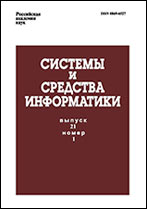|
This article is cited in 2 scientific papers (total in 2 papers)
Functional structure of the hybrid intelligent multiagent system of heterogeneous thinking for solving the problem of restoring the distribution power grid
A. V. Kolesnikovab, S. V. Listopada
a Kaliningrad Branch of the Federal Research Center "Computer Science and Control" of the Russian Academy of Sciences, 5 Gostinaya Str., Kaliningrad 236000, Russian Federation
b Immanuel Kant Baltic Federal University, 14 A. Nevskogo Str., Kaliningrad 236041, Russian Federation
Abstract:
The problems arising in the operational and dispatching management of regional power grids are characterized by heterogeneity, partial observability of the control object, as well as its dynamic nature, which determines the interdependence of the actions performed and the complexity of correcting erroneous decisions. Traditional abstract-mathematical models are limited and irrelevant to such dynamic environments and, therefore, teams of experts of different specialties are involved but due to the limited time for decision-making, it is not possible to organize comprehensive collective problem solving process. The new class of intelligent systems that simulate collective decision-making under the guidance of the facilitator, who manages the discussion, namely, hybrid intelligent multiagent systems of heterogeneous thinking, is proposed to solve such problems. The paper deals with the functional structure of such system to solve the problem of restoring the distribution power grid after large-scale accidents.
Keywords:
heterogeneous thinking, hybrid intelligent multiagent system, the problem of restoring the distribution power grid.
Received: 31.01.2019
Citation:
A. V. Kolesnikov, S. V. Listopad, “Functional structure of the hybrid intelligent multiagent system of heterogeneous thinking for solving the problem of restoring the distribution power grid”, Sistemy i Sredstva Inform., 29:1 (2019), 41–52
Linking options:
https://www.mathnet.ru/eng/ssi621 https://www.mathnet.ru/eng/ssi/v29/i1/p41
|

| Statistics & downloads: |
| Abstract page: | 177 | | Full-text PDF : | 63 | | References: | 29 |
|




 Contact us:
Contact us: Terms of Use
Terms of Use
 Registration to the website
Registration to the website Logotypes
Logotypes








 Citation in format
Citation in format 
